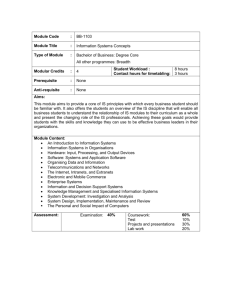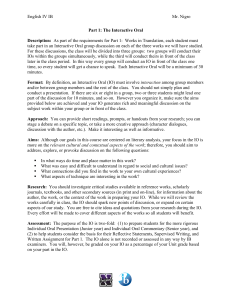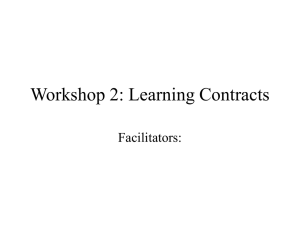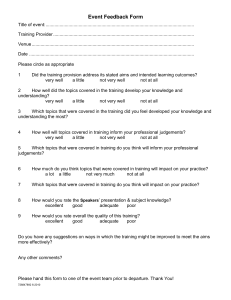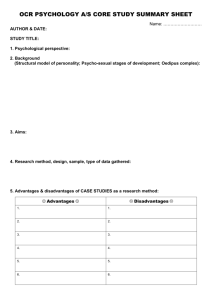Aims and Objectives
advertisement
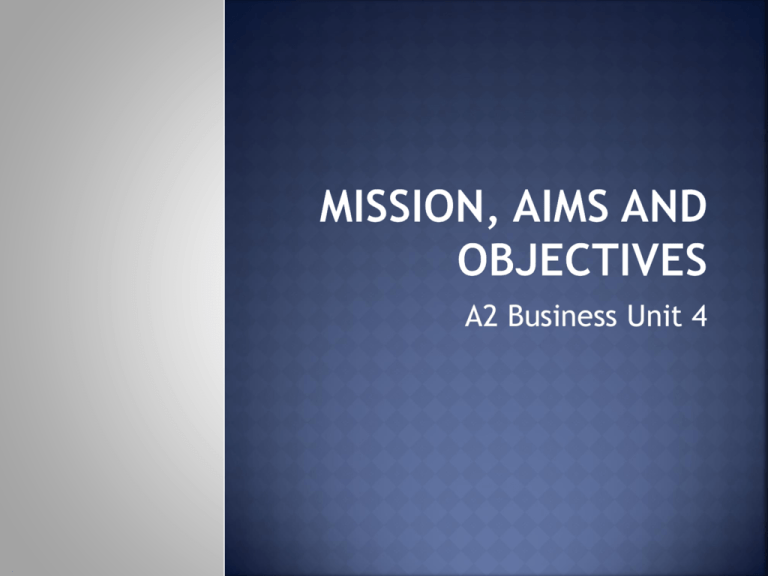
A2 Business Unit 4 Aim: Understand business’ missions, aims and objectives. Objectives: Define aims and objectives. Describe the hierarchy of objectives. Analyse the relationship between corporate strategies and corporate aims and objectives. Choose one of the following businesses, and write: An overall aim for that business. Three objectives for that business. How does the opening statement about what Virgin stand for assist when deciding how the business should grow? What strategies does Virgin use to achieve the growth of a new business venture? From the opening statement, can you tell what Virgin’s long term aims are? Definition: Long term targets that will enable the business to fulfil its’ mission. Focus the business and provide a framework on which the objectives and strategies can be decided. Can be used to judge business success. 1 • Set high standards that are recognised as the benchmark by all our stakeholders. 2 • Have a brand portfolio that will lead the industry. 3 • Demonstrate unparalleled expertise in formulating, marketing, selling and distributing own brands. Task: Bearing in mind the structure and content of the Boots corporate aims, re-write you aim, for the company you selected at the beginning. Definition: A declaration of the organisations’ purpose, principle business aims, identity, policies and value. Should form a link between aims and objectives. Stakeholders and employees should be able to clearly see the vision and values of the business. Our mission is to become the world’s leading pharmacy-led health and beauty group. We will seek to develop our core businesses of retail pharmacy and wholesale across the world and become a significant player in many major international markets. MISSION STATEMENT In your group, bearing in mind the structure and content of Boots’ mission statement. Write a mission statement for your business which you selected at the beginning of the lesson. Swap your mission statement with another group. Edit the other groups mission statement or re-write to make it better. Definition: Short term goals and targets for a business How it is going to achieve its aims. Determined by: Culture of the organisation. Private or Public sector business Age of the business. • Building on the expertise, internationally recognised brands, and balance sheet of the group, our growth opportunities will be further enhanced. Growth • It will enable us to expand our retail network in existing markets as well as new geographical territories. S M A R T • Specific: define what the firm wants to do. • Measurable: quantifiable target. E.g. 10% • Agreed: discussed and mutually agreed. • Realistic: to motivate people. • Time specific: time based target. Task: Critique Boots’ growth objective and re-write to improve Definition: Medium to long term plans detailing how the company intends to achieve its objectives. Often Large based on the outcome of a SWOT. amounts of investment, therefore difficult to change. Operational Strategies Designed to increase efficiency through economies of scale, or the best mix of capital and labour. E.g. Flexible workforce and improving market research. Corporate Strategies Securing the long term future of the business through acquisitions and mergers. Types of Strategy Generic Strategies Focus on gaining competitive advantage by making the most of the strengths of the business. Global Strategies Establishing operations in more than one country, in order to take advantage of different economic conditions. May be to lower costs, or reduce the impact of changes in exchange rates. Internal Growth • Increasing sales and profit, through internal growth. • Safest option, but takes a long time. • Example: Tesco External Growth • Takeovers, mergers. • Achieve results more quickly. • May be proffered option for international development. • Risky. Aims Mission Statement Corporate Objectives Corporate Strategies New strategy to drill 22 new oil fields in Iraq. Create an aim for this strategy. Create 2 objectives for this strategy. Outline which type of strategies will be used. Outline what type of growth this is. Create a spider diagram of the stakeholders who will be affected by this strategy and present any conflicts of interest between these stakeholders. Research and record the following for your chosen business: 1) One Aim 2) Two Objectives 3) One Mission 4) One Strategy the business is looking to introduce.

